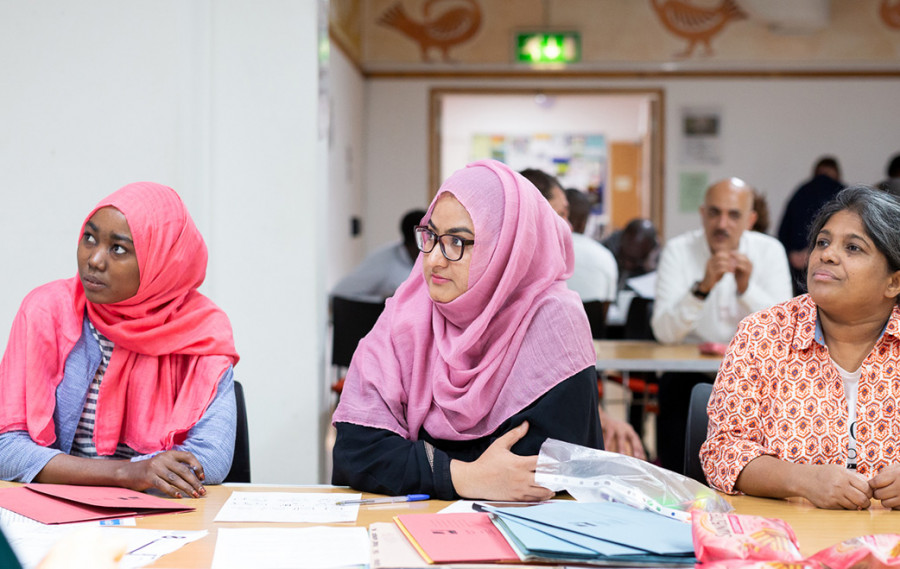The Syrian Vulnerable Persons Resettlement Scheme (VPRS) was launched by the UK governement in January 2014. Working with the UN High Commissioner for Refugees (UNHCR), the scheme identifies the people at most risk and brings them to the UK for refuge.
The scheme helps those in the greatest need, for example people requiring urgent medical treatment, survivors of violence and torture, and women and children.
We have been involved in the SVPRS since December 2015, working with several local councils to help settle Syrian families that arrive in Berkshire through the scheme. We started working with The Royal Borough of Windsor and Maidenhead, before extending to support Reading Borough, West Berkshire and Wokingham Borough Councils.
In total, we have supported 25 families – 125 men, women and children – across Berkshire, and we are currently supporting 18 families.
The Syrian Support Team
Our Syrian Support Team are:
- Flora Roshi – Syrian Team Manager
- Samera Abbas-Majid – Syrian Team Caseworker (West Berkshire)
- Soha Hafaz – Syrian Team Caseworker (Reading)
- Shady Hagag – Syrian Team Caseworker (Wokingham)
Upon Arrival
Each family is given a caseworker from RRSG to help them to settle in. The caseworker meets the family at airport when they arrive in the UK.
The family are escorted to their new home, shown around, and told how everything works. We give them a welcome pack, with a guide to the local area, health services, and what to expect from the culture they have arrived in – everything from how to access emergency services (and that you don’t need to run from the police in the UK!) to finding their way around the area.
The families are given groceries and a small amount of cash to tide them over until their benefits are processed.
Nurturing Independence
We provide a lot of support to help each family to settle in.
We help each family open bank accounts, apply for benefits, and register with their local doctor, school and English classes.
During the first few months the support is very intensive. We get to know the family and understand their needs, so that we can help them become independent. We introduce them to other Refugees and local community groups, to the library and to local events.We work to build their confidence and encourage them to volunteer and look for jobs.
Our aim is for each family to feel part of their community, building their confidence, empowering them to become independent and building a new life in UK.
The Syrian Team’s hard work and dedication has seen numerous Syrian families embrace UK culture, learn English and find work. Many volunteer to help the new families to get settled and provide a source of inspiration.
The families have fled the violence, threats to life and discrimination in Syria. Many have been living in Refugee camps in the neighbouring countries for some years.
Their journey has been long and hard, and they arrive here with high hopes of building a happy new life for themselves and their children. We work very closely with their doctors, schools, job centres and employers to support their complex needs and to help them settle and feel welcome.
We Can’t Do This Alone
The resettlement process would not work without the time, effort and generosity of a wide range of individuals, organisations and agencies. We may initiate the process, but it takes a whole network of support around each family to find their feet – from their the people who donate their toys for the child, to the welcoming religious congregation – we’d like to thank everybody involved in the process.
Our Main Challenges
Most families arrive in the UK with little or no English, so what could be a simple task is much harder for them. For example, to call the electricity supplier to set up a direct debit, the company will require the family to give their authority for us to speak on their behalf. This involves them having to answer numerous security questions in English, giving their full name, address, Date of Birth and more. This next to impossible for someone who cannot speak any English.
Language is a big barrier to finding work, especially when individuals want to continue with their previous carrier. Many of of the families have wide and varied skills and experience including carpenters, welders, calligraphers, tailors, electricians, mechanics and engineers.
Case Studies
Abood* worked as a car mechanic in Syria to support his family. Here in the UK, he is studying at college full time and wants to study mechanics. He is looking for opportunity to train in a local garage and hopes that one day will be able to open up his own garage.
Burhan* arrived in UK under the Syrian Resettlement Programme with his wife and children. As a family they were supported with integration into their local community and accessing services by RRSG staff and volunteers. The whole family began to increase their independence and develop their language skills by attending schools, ESOL courses and our drop in centre. It was here that they built connections many others including volunteers and other Syrian families. And as a result of attending English classes and hard work the level of English improved rapidly, which has again helped the family to become more independent as the father managed to find a part time job. The mother’s English improved as well as the kids from the school, they have friends from the neighbourhood and from the school and they are integrated very well in the community.
Waleed* and his family arrived in 2019. The father was working in trade but he couldn’t find a job in his field of work. He didn’t speak any English when he first came to UK. He attended our drop in centre ESOL classes and we arranged other classes for him twice a week in the community centre. His English is now improved and he is fully independent and manages his family affairs quite well. Also he found a job in a take away restaurant and now working part time and looking to increase his working hours.
*Names changed to protect confidentiality.
If you would like to help the Syrian families we support, please make a donation.

